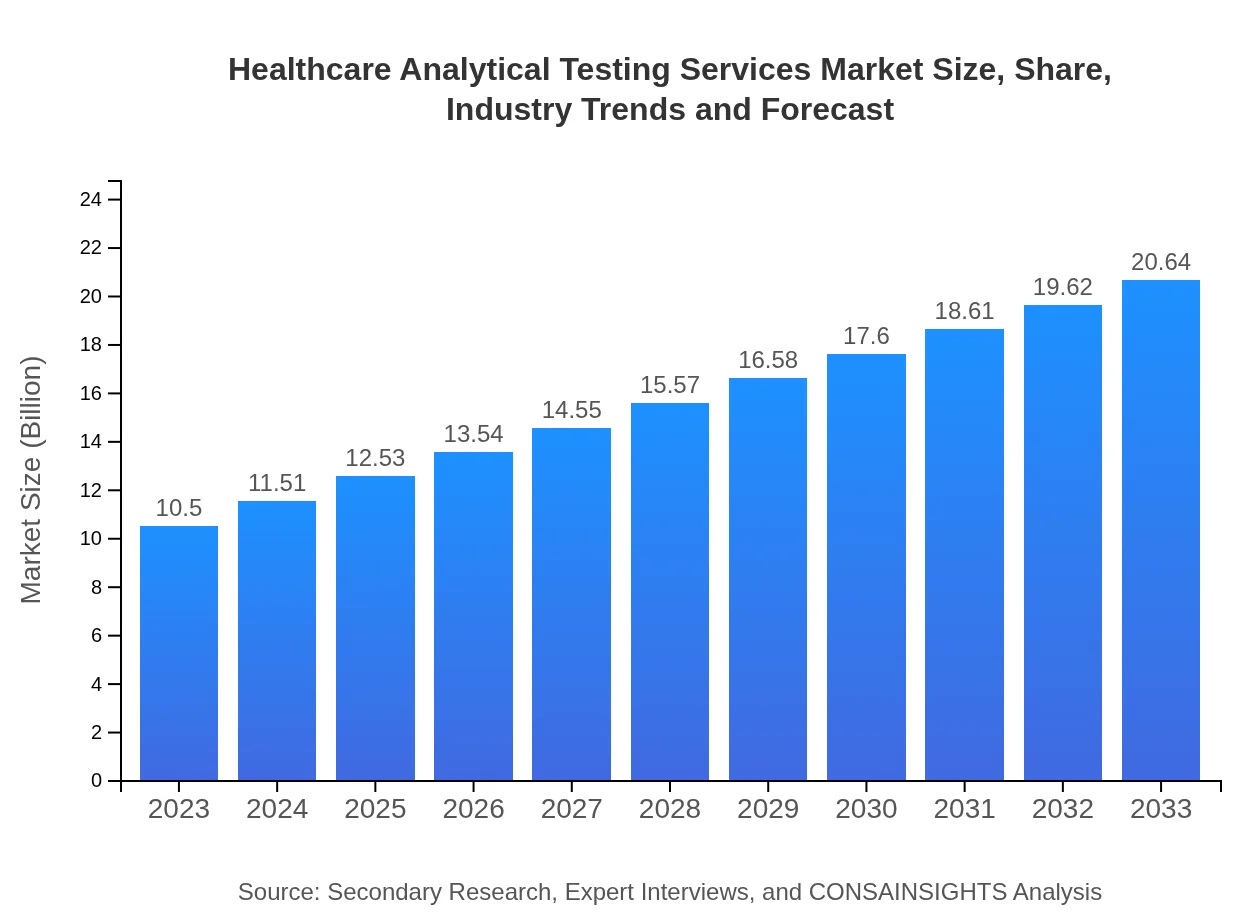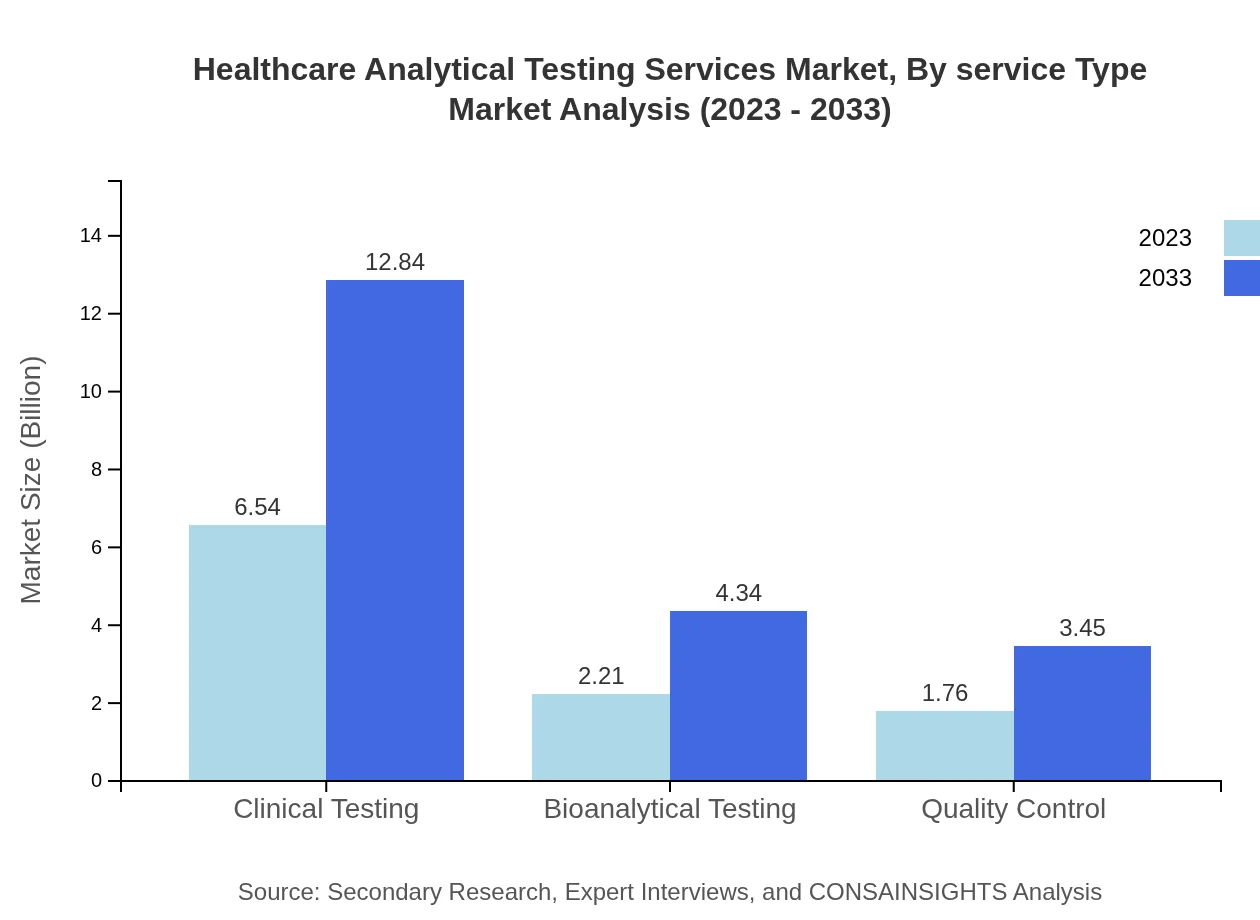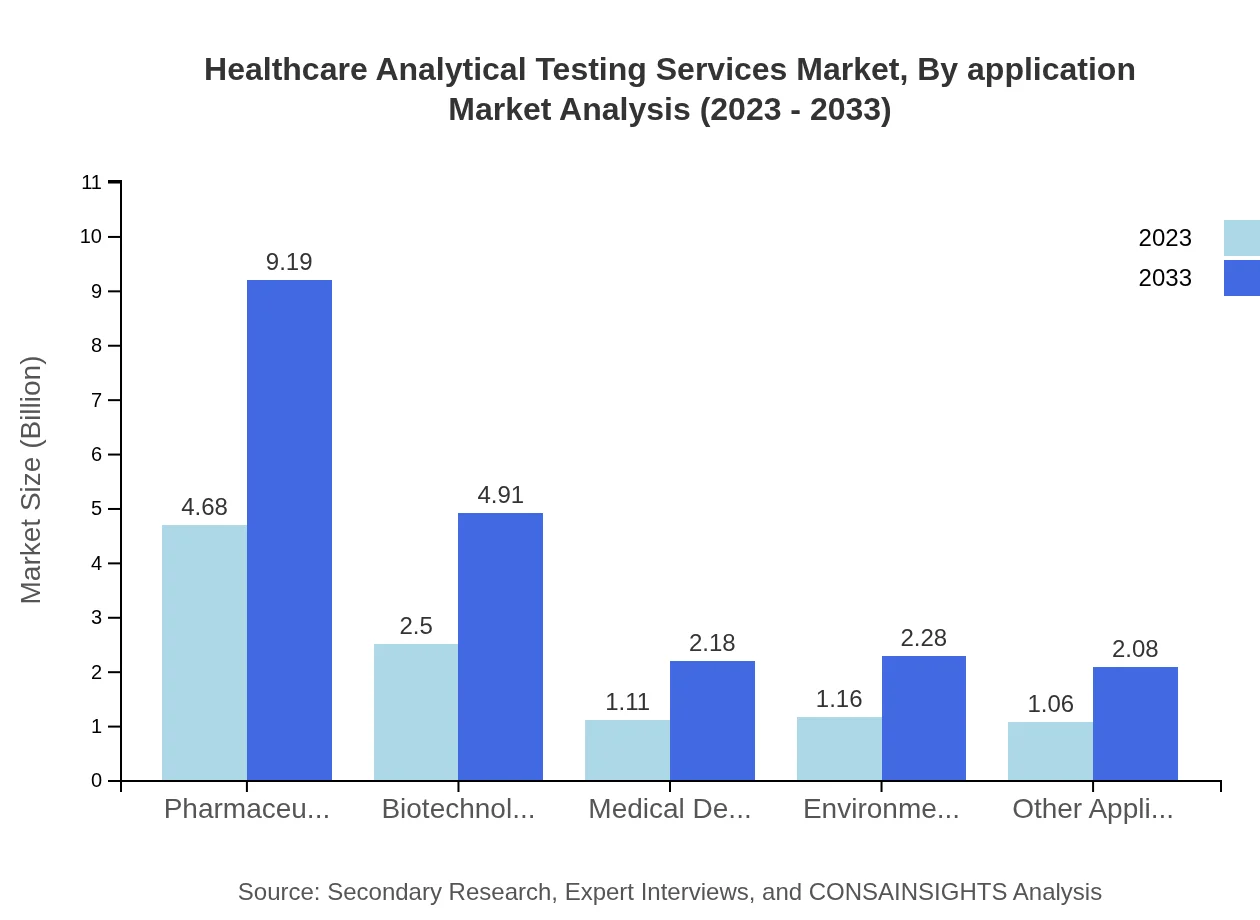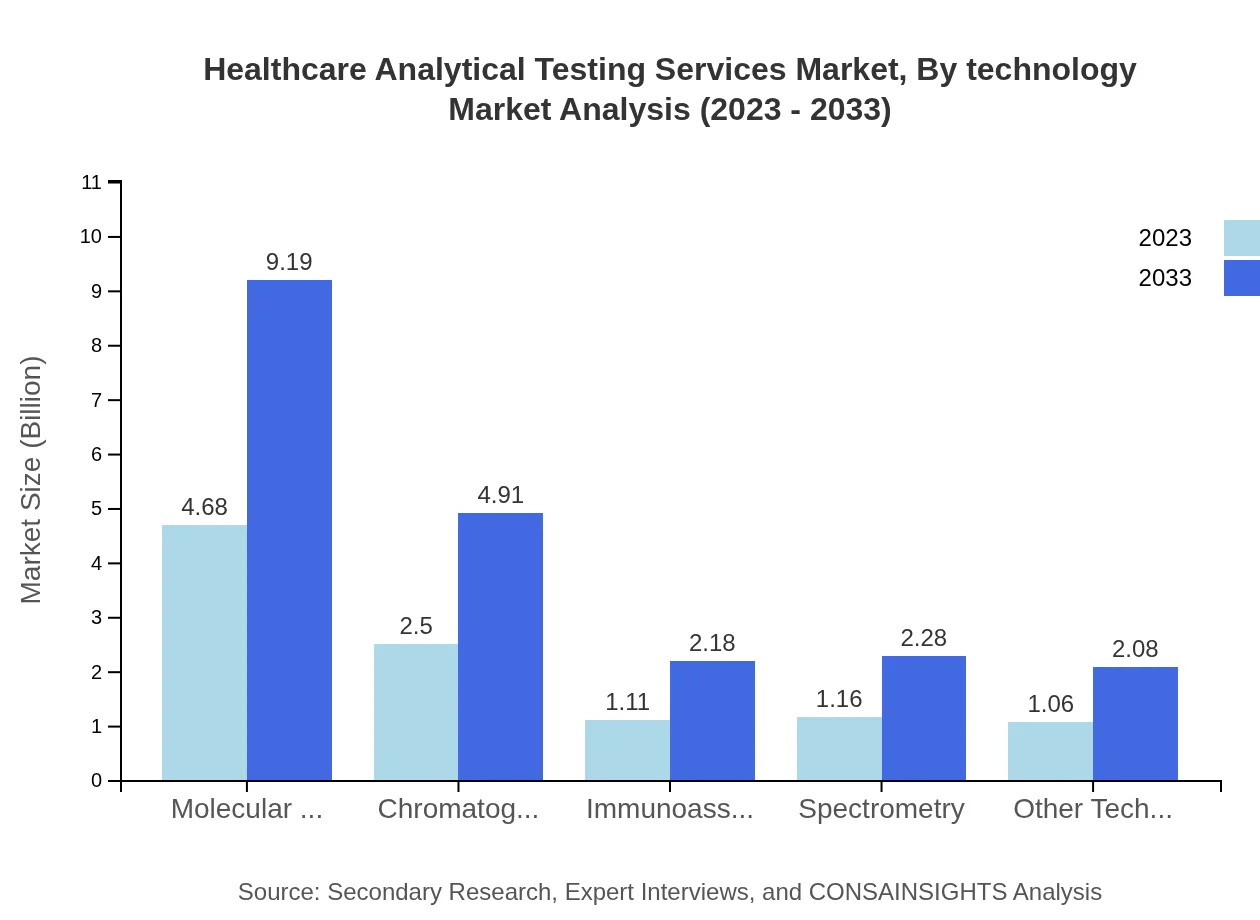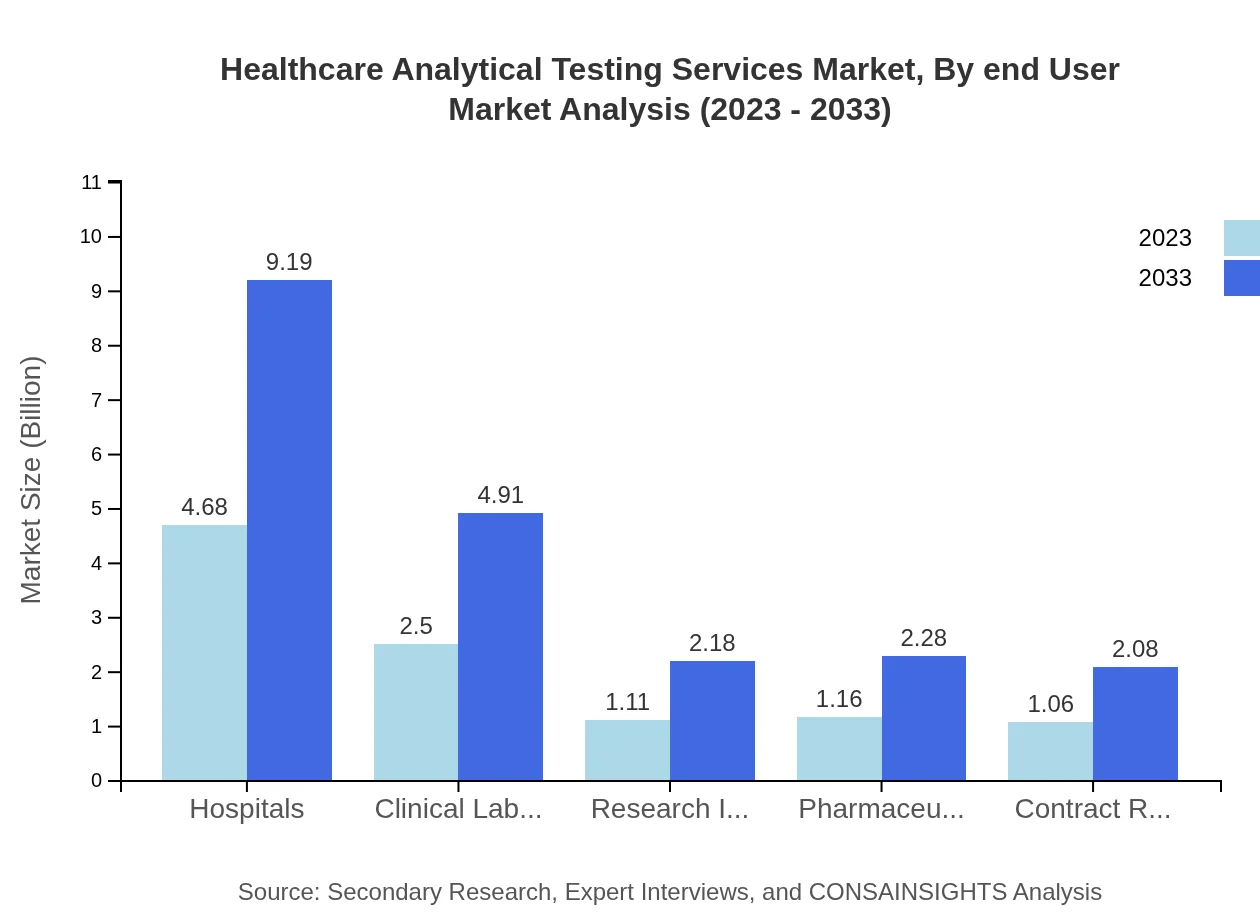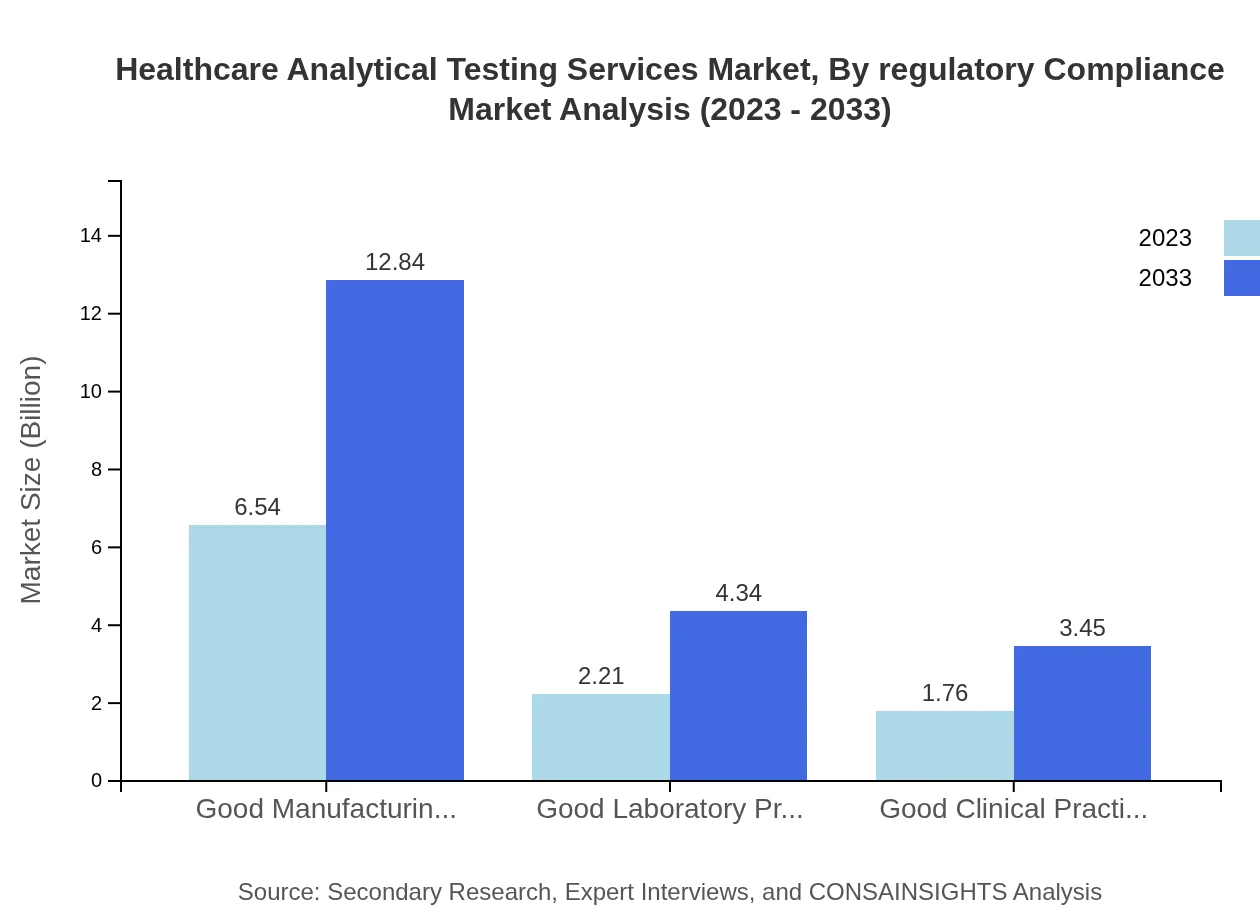Healthcare Analytical Testing Services Market Report
Published Date: 31 January 2026 | Report Code: healthcare-analytical-testing-services
Healthcare Analytical Testing Services Market Size, Share, Industry Trends and Forecast to 2033
This report provides a comprehensive analysis of the Healthcare Analytical Testing Services market, covering market size, growth trends, and forecasts from 2023 to 2033. It offers insights into market segmentation, regional dynamics, and key industry players in this evolving landscape.
| Metric | Value |
|---|---|
| Study Period | 2023 - 2033 |
| 2023 Market Size | $10.50 Billion |
| CAGR (2023-2033) | 6.8% |
| 2033 Market Size | $20.64 Billion |
| Top Companies | Thermo Fisher Scientific, Eurofins Scientific, SGS SA, Pace Analytical |
| Last Modified Date | 31 January 2026 |
Healthcare Analytical Testing Services Market Overview
Customize Healthcare Analytical Testing Services Market Report market research report
- ✔ Get in-depth analysis of Healthcare Analytical Testing Services market size, growth, and forecasts.
- ✔ Understand Healthcare Analytical Testing Services's regional dynamics and industry-specific trends.
- ✔ Identify potential applications, end-user demand, and growth segments in Healthcare Analytical Testing Services
What is the Market Size & CAGR of Healthcare Analytical Testing Services market in 2023?
Healthcare Analytical Testing Services Industry Analysis
Healthcare Analytical Testing Services Market Segmentation and Scope
Tell us your focus area and get a customized research report.
Healthcare Analytical Testing Services Market Analysis Report by Region
Europe Healthcare Analytical Testing Services Market Report:
The European market for Healthcare Analytical Testing Services is expected to grow from $2.83 billion in 2023 to $5.57 billion in 2033. Factors such as robust healthcare regulations, growing R&D activities, and an increasing number of drug launches drive this growth.Asia Pacific Healthcare Analytical Testing Services Market Report:
The Asia Pacific region, with a market size of approximately $2.22 billion in 2023, is projected to reach $4.36 billion by 2033, driven by growing healthcare infrastructure, increased outsourcing of analytical services, and rising investments in biotechnology.North America Healthcare Analytical Testing Services Market Report:
North America remains the largest market for Healthcare Analytical Testing Services, valued at $3.79 billion in 2023 and projected to reach $7.45 billion by 2033. The region's growth is fueled by the presence of major pharmaceutical companies, advanced research facilities, and stringent regulatory requirements.South America Healthcare Analytical Testing Services Market Report:
In South America, the Healthcare Analytical Testing Services market is expected to grow from $0.55 billion in 2023 to $1.08 billion by 2033. Factors contributing to this growth include increasing healthcare expenditures and a rising demand for high-quality testing services amid pharmaceutical innovations.Middle East & Africa Healthcare Analytical Testing Services Market Report:
In the Middle East and Africa, the market size is anticipated to increase from $1.11 billion in 2023 to $2.18 billion by 2033, supported by improving healthcare systems, greater focus on disease prevention, and advancements in laboratory technology.Tell us your focus area and get a customized research report.
Healthcare Analytical Testing Services Market Analysis By Service Type
The market is predominantly characterized by its service types. Hospitals represent the largest segment, with a size of $4.68 billion in 2023, growing to $9.19 billion by 2033, holding a share of 44.55%. Clinical Laboratories follow with $2.50 billion in 2023, expanding to $4.91 billion, capturing a share of 23.77%. Other key segments include Research Institutes, Pharmaceutical Companies, and Contract Research Organizations, which cumulatively enhance the market's value.
Healthcare Analytical Testing Services Market Analysis By Application
The applications of Healthcare Analytical Testing Services are broad, ranging from clinical testing to bioanalytical testing. Clinical Testing dominates with a size of $6.54 billion in 2023 and an expected growth to $12.84 billion by 2033, holding a stable share of 62.24%. Pharmaceutical applications are a significant focus area, with a market size of $4.68 billion expected to grow considerably as new therapies are introduced to address various healthcare challenges.
Healthcare Analytical Testing Services Market Analysis By Technology
Key technologies employed in the Healthcare Analytical Testing Services market include chromatography ($2.50 billion in 2023), molecular biology ($4.68 billion), and spectrometry ($1.16 billion). These technologies play essential roles in various testing processes, ensuring accuracy and reliability, critical for regulatory compliance and drug development.
Healthcare Analytical Testing Services Market Analysis By End User
Hospitals and clinical laboratories are the primary end-users in the Healthcare Analytical Testing Services market, accounting for significant shares. With the rise of personalized medicine, research institutes and contract research organizations are also increasingly utilizing these services, augmenting their overall market presence.
Healthcare Analytical Testing Services Market Analysis By Regulatory Compliance
Regulatory compliance is a pivotal aspect of the Healthcare Analytical Testing Services market. Good Laboratory Practice (GLP) and Good Clinical Practice (GCP) standards ensure the integrity of data and safety of clinical trials. Companies adhering to these guidelines are more likely to gain trust from regulatory bodies and end-users, enhancing their market competitiveness.
Healthcare Analytical Testing Services Market Trends and Future Forecast
Tell us your focus area and get a customized research report.
Global Market Leaders and Top Companies in Healthcare Analytical Testing Services Industry
Thermo Fisher Scientific:
A leader in analytical testing services, Thermo Fisher offers a wide range of laboratory services specializing in biopharmaceuticals, environmental testing, and clinical diagnostics.Eurofins Scientific:
Eurofins provides high-quality laboratory services across various sectors including pharmaceutical testing, and is known for its extensive global network of laboratories.SGS SA:
SGS SA offers comprehensive analytical solutions and is recognized for its commitment to quality and regulatory compliance in healthcare testing services.Pace Analytical:
A prominent provider in laboratory services, Pace Analytical focuses on a diverse range of applications, including environmental testing and compliance analysis for the healthcare sector.We're grateful to work with incredible clients.









FAQs
What is the market size of healthcare Analytical Testing Services?
The healthcare analytical testing services market is projected to reach approximately $10.5 billion by the year 2033, expanding at a compound annual growth rate (CAGR) of 6.8% from its 2023 valuation.
What are the key market players or companies in this healthcare Analytical Testing Services industry?
Key players in the healthcare analytical testing services market include major laboratories, pharmaceutical companies, research institutes, and contract research organizations. Notable names may include LabCorp, Charles River Labs, and Eurofins Scientific, which excel in providing analytical testing solutions.
What are the primary factors driving the growth in the healthcare Analytical Testing Services industry?
Factors driving growth include the rise in chronic diseases, increased focus on quality control in pharmaceuticals, and advancements in analytical technology. Furthermore, a growing emphasis on regulatory compliance and a surge in clinical trials significantly contribute to market expansion.
Which region is the fastest Growing in the healthcare Analytical Testing Services?
North America is the fastest-growing region in the healthcare analytical testing services market, expected to grow from $3.79 billion in 2023 to $7.45 billion by 2033. This growth is fueled by increasing healthcare expenditure and technological advancements.
Does ConsaInsights provide customized market report data for the healthcare Analytical Testing Services industry?
Yes, ConsaInsights offers customized market reports tailored to specific client needs within the healthcare analytical testing services market, ensuring insights that align with unique strategic objectives and regional focus.
What deliverables can I expect from this healthcare Analytical Testing Services market research project?
Expect comprehensive reports detailing market size and growth forecasts, competitive analysis, segmented data, and insights into regional dynamics, trends, and drivers impacting the healthcare analytical testing services market.
What are the market trends of healthcare Analytical Testing Services?
Trends in the healthcare analytical testing services market include increased outsourcing of testing services, integration of digital technologies, an emphasis on precision medicine, and a growing demand for bioanalytical testing, reflecting broader changes in the healthcare landscape.

